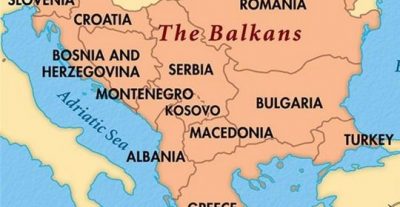EU Offers West Balkans €3.3 Billion as Forgiveness for Coronavirus Snub

The European Union promised €3.3 billion to the West Balkan countries and provinces of Serbia, Montenegro Albania, Bosnia, Kosovo, Montenegro and North Macedonia. In return, the European Union is demanding loyalty and renunciation of close ties with Moscow and Beijing. However this is unlikely after the initial refusal of Brussels to supply aid and relief and there is now little trust in European Union solidarity.
“The EU is mobilizing a substantial financial package, confirming the strong solidarity. Together we will overcome this crisis and recover. And beyond that, we will continue to support the region, including with the reforms needed on their EU path, as the recovery will only work effectively if the countries keep delivering on their commitments,” said European Union Commission President Ursula von der Leyen.
Her comments about substantial financial packages only came when in March she announced in a Twitter video message that the European Union is restricting the export of medical devices and stressed that the ban on exports of these goods applies throughout the entire EU and is linked to the need to maintain sufficient supplies of medical supplies within the alliance. This announcement prompted Serbian President Aleksandar Vučić to say that European solidarity is just a “fairy tale on paper” and that China was the only country who could help them.
European response to the #coronavirus: Protecting people‘s health and ensuring that goods flow in the internal market pic.twitter.com/9JNBzHjqvc
— Ursula von der Leyen #UnitedAgainstCoronavirus (@vonderleyen) March 15, 2020
Not only did China help Serbia, but so too did Russia. Obviously, the European institutions, even reluctant to help fellow member countries such as Italy and Spain, did not hesitate to make an indignant face by denouncing Moscow and Beijing of exploiting the coronavirus pandemic to ensure a greater presence in the Balkans. And with the usual hypocrisy they explained that the Commission had not denied aid, but simply stressed the need to obtain the consent of all 27 member countries before granting it. In short, a mockery. Aware that they have lost much of their credibility, the European Union are now attempting to recover lost ground.
The first move was the video conference on May 6 in which European Union leaders and the heads of state and government of the 27 member countries listened to the requests of the six states in the West Balkans who are waiting to be admitted into Union. This expectation was frustrated in mid-October by Emmanuel Macron’s veto who was determined to block the negotiations to Albania and North Macedonia. A veto officially returned last February when the French president, under pressure from other European Union members and NATO concerned about the favor given to Russia and China, agreed to adapt to the Commission’s decisions.
However, North Macedonia also faces difficulty from Bulgaria who has vowed to block any accession so long as Skopje continues to claim there is a “Macedonian minority” in Bulgaria and not acknowledge that the main language of North Macedonia, as Bulgaria claims, is actually a West Bulgarian dialect. Albania also faces difficulty as it could face a veto from Greece as Tirana continues to discriminate against the Greek minority in Northern Epirus.
However, ignoring these disagreements that exist in the West Balkans, European bureaucrats have put on the table €3.3 billion to be distributed to all the countries and states that agree to refuse any Russian or Chinese aid. The need to use money to buy Balkan loyalty is a clear sign of how unattractive the European project has now become – having itself been questioned and become widely unpopular in Italy and Spain.
In addition to the feared penetration of Russian soft-power based in centuries-old relationships of culture, identity and religious tradition with the Serbian people and their communities in Bosnia, Montenegro and Kosovo, the Chinese and the Turks are also exhibiting far more influence in the region compared to the European Union. China, in addition to donating health products needed in the fight against coronavirus is also building a new railway line. This new railway line agreement with Hungary and Serbia and financed by the Exim Bank of China, will connect the port of Piraeus in Greece to Budapest and Belgrade. In addition to traditional relations with the Muslim communities of Bosnia, Kosovo and Albania, Turkey has also developed very intense trade and exchanges with Serbia and Montenegro.
In short, the €3.3 billion promised by Europe risks proving to be the counterpart of an illusion that has already vanished. And to understand it, Milorad Dodik, the Serb Member of the Presidency of Bosnia and Herzegovina, said “the Europe we believed in ten years ago no longer exists today.”
*
Note to readers: please click the share buttons above or below. Forward this article to your email lists. Crosspost on your blog site, internet forums. etc.
This article was originally published on InfoBrics.
Paul Antonopoulos is an independent geopolitical analyst.
Featured image is from InfoBrics

